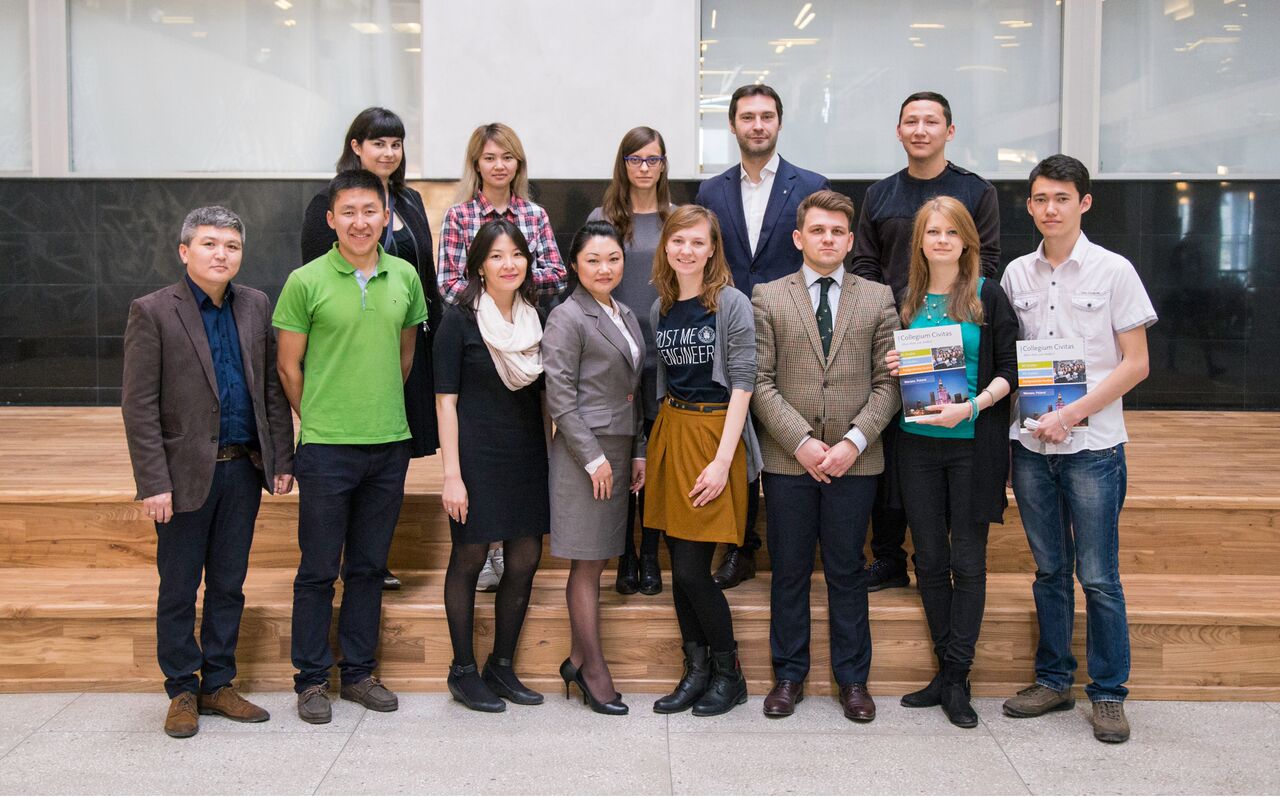Delegation of Polish Universities and Government Officials visit AUCA to discuss Collaboration
April 6, 2016
April 5, 2016, a group of representatives of Polish universities and the Polish Ministry of Science and Higher Education met with chair of the psychology department Elena Kim, international student coordinator Iliyas Mamadiyarov, and coordinator of academic affairs Nazgul Koilubaeva to discuss potential academic collaboration and the development of exchange programs between Polish universities and AUCA.
The delegation represented the Polish Ministry of Science and Higher Education as well as four Polish universities: Justyna Kulpa, a specialist in the Ministry of Science and Higher Education; Michał Sobczyk, a senior specialist in the Ministry of Science and Higher Education; Tomasz Brańka, the vice-dean of the Adam Mickiewicz University (AMU), Bakyt Orozbaev, a postdoctoral researcher at AMU; Olga Vyshnevska, a specialist from Collegium Civitas; Justyna Andrejczuk, an administrative clerk from Poznan University of Technology (PUT); and Aleksandra Kania, a specialist from Poznan University of Economics (PUE).

Collegium Civitas, located in the Polish capital, Warsaw, has an existing academic exchange program with AUCA, but the program has been relatively inactive—only two AUCA students have used the program to study in Warsaw since 2007, and no students have ever been brought to AUCA from Collegium Civitas through the program. Their representative said the university has a desire to increase academic exchange both to and from Collegium Civitas.
The other three universities, AMU, PUT, and PUE, are located in one of Poland’s largest cities, Poznan, found halfway between Warsaw and Berlin. The city is home to over twenty-five other higher education institutions, and, with one in every four inhabitants a student, the city rightly calls itself the most dense academic hub in Poland. AMU has almost 50,000 students, PUT 21,000, and PUE 11,000, each dwarfing AUCA by comparison and potentially providing new opportunities for intellectual and personal growth for our students.
The three poznanskie universities have never collaborated with AUCA before, but all cited increased strategic emphasis on international partnerships and a lack of Polish involvement with Kyrgyzstan as a strong motivation to start.
PUE already has international partnerships with over 100 institutions, including Georgia State University in the US, but is looking to grow its international programs, with Kyrgyzstan as an encouraging prospect. Their representative underlined their interest in researcher and professor exchanges in addition to student exchanges.
PUT currently participates in the Erasmus program and offers double degrees through partnerships with a few French universities. The university representative said PUT is interested in exploring a partnership with AUCA.
The AMU representative explicitly noted AMU students’ growing interest in Central Asia through the Erasmus Mundus program, and suggested AUCA is well positioned to help AMU reach its goals in international program development.
The meeting was overall a success, with the university and government representatives impressed by AUCA—in particular AUCA’s European Credit Transfer and Accumulation System (ECTS) accreditation and AUCA’s new campus—and excited to start more serious talks on collaboration. Kim and Mamadiyarov expressed AUCA’s excitement to grow its own international programs in Poland. AUCA presently has around twenty-five international partnerships, though only eighteen are active. Partnerships with the Polish universities would contribute to AUCA’s commitment to cultural exchange and help grow AUCA’s nascent research programs.
The only setback was a note that Erasmus+ (a new 14.7 billion euro umbrella program signed in 2013, which includes Erasmus Mundus) stipulates Polish universities are unable to send their undergraduate students to Kyrgyzstan for the time being. Erasmus+ allows, with a few caveats, the exchange of graduate students, post-graduate students, professors, and academic staff; Erasmus+ does not limit the mobility of individuals from the Kyrgyz Republic to Poland.
Brańka pointed out that this stipulation could be changed in the future, contingent upon the success of extant exchange programs. Brańka also noted that exchanges will be totally financed by the Erasmus+ program and “ninety percent of administrative work will be handled by us, [the Polish universities].”
To conclude the meeting, Mamadiyarov brought in Nazim Ibraimov and Adyl Kenzhebek to talk about their experiences with AUCA’s international exchange program.
Ibraimov, who spent a semester at Collegium Civitas, told the representatives the story of his relationship to Poland, starting with his love of Polish poet Wislawa Szymborska, taking first place at a Polish literature competition, and a subsequent promise to himself to one day visit Poland. When asked about what he would change about the exchange program, Ibraimov responded, after a twenty second pause, there should be an involved international student coordinator, specifically mentioning his difficulty finding affordable and convenient housing. He added later, “if someone isn’t ready for the culture shock and meeting new people, they should wait a bit.”
Kenzhebek plans to spend the upcoming fall semester in Latvia at Vidzemas Augstskola University of Applied Sciences. His interest in AUCA’s international exchange programs was bolstered by several conversations with Ibraimov about his experience in Poland. Kenzhebek said he is most excited about meeting new people and learning things he would not be able to at AUCA.
The delegation’s visit included a campus tour to show off AUCA’s new building. Vyshnevska commented that their students would definitely be interested in studying at AUCA after seeing photos of the unique and modern campus building.
